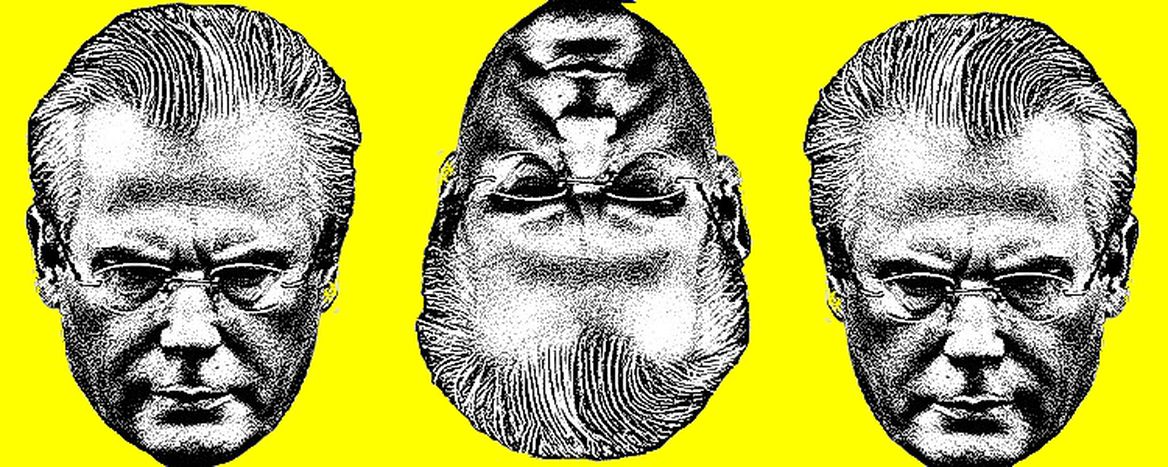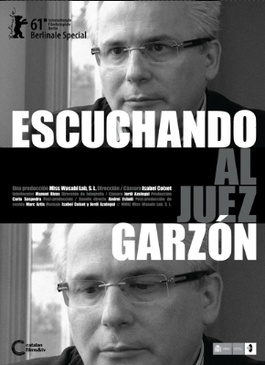
Documentary 'Listening to Garzon': Spain’s most famous judge judged
Published on
‘Escuchando al Juez Garzón’ is an 87-minute documentary shot as a single interview with the high-profile human rights judge in Madrid in late 2010. Over a year later, he is going on trial for triple prosecutions on his abuses of power at his country's supreme court. International human rights activists argue that this 'Judge Dredd' case is one of Spanish science fiction
13 February 2012 marks thirty-one years of a distinguished career for the failed socialist politician from Jaen in southern Spain. However for each of those decades there's a lawsuit up against one-time human rights hero Baltasar Garzón Real, who goes on trial at the supreme court of Madrid for perversion of the truth and overreaching his powers as a judge in investigating over 100, 000 disappearances during the dictator Francisco Franco’s rule, on 24 January 2012. He stands trial for a second case, ‘Gurtel’, where he allegedly permitted secret recordings by the police between lawyers and their clients. All good things come in three: the third prosecution is scheduled to investigate Garzon’s actions in a case with the Santander bank whilst in New York.
Hero or zero?
We’ve heard Garzon’s side of the story - at least via Catalan director Isabel Coixet’s documentary Escuchando al Juez Garzón('Listening to Judge Garzon'), which was screened at the Berlin film festival in the ‘specials’ section in February 2011. It was released in Spanish cinemas at the end of April, before being screened at festivals from Rio de Janeiro to Biarritz and Manchester. On 19 February 2012 it is tipped to win best documentary at the Spanish ‘oscars’, the Goyas - perhaps because the Spanish academy of cinema is made up of artists who officially defend Garzon's cause - two voting members include director Pedro Almodovar and Pilar Bardem, mother of actor Javier.
The film only has a Portuguese distributor for the moment; Spain’s Iberian neighbours can prepare themselves for a ninety minute quasi-monologue. It is cut from a six-hour conversation between the writer Manuel Rivas and Garzon on 18 December 2010: how should a judge think? What should he do at a crime scene? In Escuchando al Juez Garzón we hear Garzon’s general beliefs in fighting terrorism globally. He even shares a funny anecdote of what it was really like to issue a 1998 international arrest warrant in London for Chile's former president general Augusto Pinochet. The historic indictment for the unaccounted murders of Spanish citizens was a landmark in reviewing amnesty cases worldwide. The film is great for a pan-European audience - Garzon pays tribute to the murdered Italian judges of time past and highlights how he has worked with the UK. It is also an insight into Spanish society and culture through a legal system which can promote a discipline of 'you can put your hand in the till, but don't get caught', and the extreme right wing influence of the country's politicians.
'Painful' legal attack
 The documentary is an opportunity to see a human being talking about the 'painful' legal attack he is under for his investigation into Franco's regime under the topic of historical memory in 2008. This is a man who even tried to go after Silvio Berlusconi via the European courts, though we don't talk about it in the film, which would have been valid considering the former Italian premier's majority of acquittals in his various trials. On 13 January, the international group human rights watch released a statement damning the magistrate’s upcoming trials. ‘Thirty-six years after Franco’s death, Spain is finally prosecuting someone in connection with the crimes of his dictatorship – the judge who sought to investigate those crimes,’ states Reed Brody, counsel for the NGO.
The documentary is an opportunity to see a human being talking about the 'painful' legal attack he is under for his investigation into Franco's regime under the topic of historical memory in 2008. This is a man who even tried to go after Silvio Berlusconi via the European courts, though we don't talk about it in the film, which would have been valid considering the former Italian premier's majority of acquittals in his various trials. On 13 January, the international group human rights watch released a statement damning the magistrate’s upcoming trials. ‘Thirty-six years after Franco’s death, Spain is finally prosecuting someone in connection with the crimes of his dictatorship – the judge who sought to investigate those crimes,’ states Reed Brody, counsel for the NGO.
'Depicting a reviled figure such as Garzon when his career was being so loudly stalled could make or break the director's own'
Cinematically speaking there's little to expect from Coixet. The Barcelona-born director and 2009 Berlin film festival jury member keeps her distance and hovers mainly around a naturally lit table where Garzon speaks. Some say it's wise to do so, as depicting a reviled figure such as Garzon when his career was being so loudly stalled could make or break her own. Isabel Coixet probably knows that. The questions put to Garzon are quite consensual and emotive, such as when his family is mentioned. This is a film to be enjoyed for its human depiction of an institutional person, one of Europe's most famous of latter decades, no matter what the results of his trials may be.
Journalists can sign up to the website to watch the film here
Image: main (cc) facebook.com/SolidariosconGarzon; in-text poster courtesy of the distributors, Miss Wasabi



